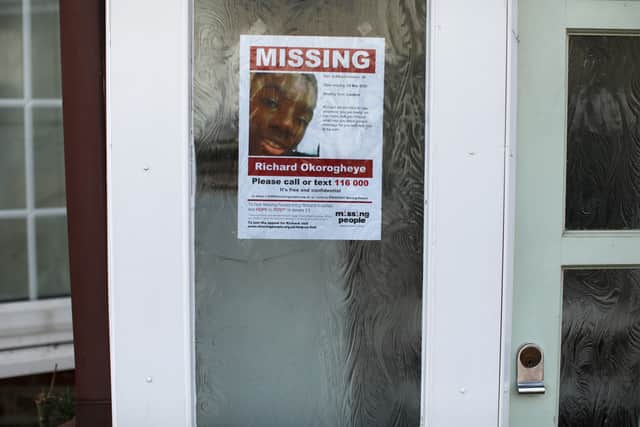What happened to Richard Okorogheye? When did he go missing, what is sickle cell anaemia
and live on Freeview channel 276
Richard Okorogheye was the focus of a much-contested missing person investigation in 2021 which led to an apology from the Metropolitan police.
Following the release of a report into the handling of missing persons reports which found disparities in how cases were handled depending on the race of the missing person, Richard’s mother spoke about her experience of institutional racism on Good Morning Britain.
Advertisement
Hide AdAdvertisement
Hide AdEvidence Joel spoke to GMB hosts Richard Madeley and Susanna Reid about the loss of her son in 2021 and the response of the Metropolitan police who were responsbile for investigating the disappearance.
What happened to Richard Okorogheye?
Richard Okorogheye, a Black man, was 19 years old when he went missing from his home in West London in March 2021 - two weeks later, his body was discovered in a lake in Epping Forest, East London, 20 miles from his home.


A police investigation into Richard’s disappearance although there had been claims that the case was not being taken seriously. Two officers were issued with misconduct notices over failures that they had failed to pass on relevant information to the team handling the investigation.
One call handler said to Richard’s family “If you can’t find your son, how do you expect us to?”
Advertisement
Hide AdAdvertisement
Hide AdThe Independent Office for Police Conduct (IOPC) found that the police had not correctly recorded Richard’s medical condition - he had sickle cell anaemia, which made him more vulnerable.
The Guardian reported that a report from the charity Missing People found that missing person cases concerning Black and Asian people are less likely to be resolved than cases of white people.
The IOPC forced the Metropolitan police to apologise for the way that Richard Okorogheye’s case had been handled. Richard’s family rejected the Met’s apology. Although siginificant failings has been found, none of the three officers or three staff responsible for the investigation faced disciplinary proceedings.


During a segment on Good Morning Britain about institutional racism, Evidence Joel said of her son: “He was my baby, he was my crown. They took him away from me. I miss him every single day.
Advertisement
Hide AdAdvertisement
Hide Ad“I wish something could have been done, I wish he could have been here. He was the only child I had. When Richard went he took a part of me away. Took my soul."
Evidence also said that she felt ignored by the police when her son went missing because of her skin colour and accent.
What is sickle cell anaemia?
Sickle cell anaemia is a type of inherited health condition which affects the red blood cells - it is more common in people with African or Caribbean heritage.
Sickle cell disease causes red blood cells to be unusually shaped - they don’t live as long as healthy blood cells and can cause problems by blocking arteries. For most people there is no cure for the condition, although treatments are available to relieve pain and prevent complications caused by it.
Potential health problems caused by sickle cell anaemia include the risk of kidney damage, kidney disease, and stroke.
Comment Guidelines
National World encourages reader discussion on our stories. User feedback, insights and back-and-forth exchanges add a rich layer of context to reporting. Please review our Community Guidelines before commenting.
